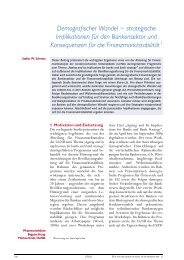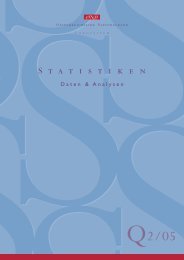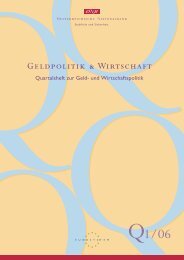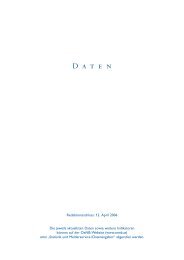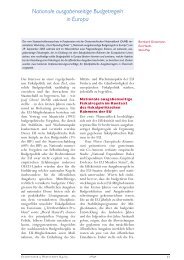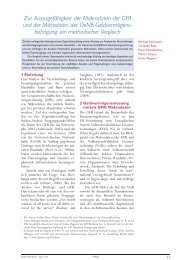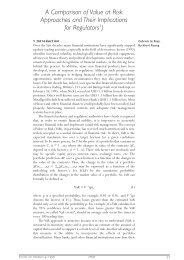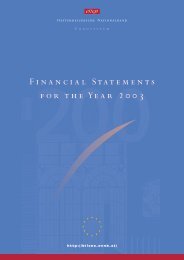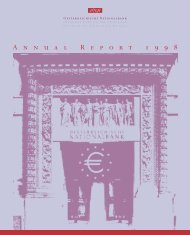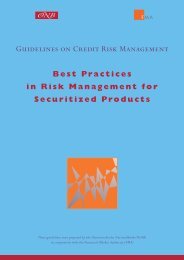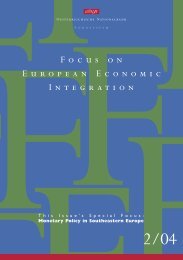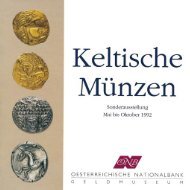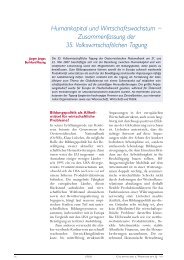Create successful ePaper yourself
Turn your PDF publications into a flip-book with our unique Google optimized e-Paper software.
The OeNB as a Competent Partner in<br />
Ensuring Financial Stability<br />
Stress test results<br />
prove shock<br />
resilience of the<br />
Austrian banking<br />
system<br />
funds between January and December<br />
<strong>2004</strong> came to 6.0%, up from<br />
5.5% in 2003.<br />
Pension fundsÕ assets amounted to<br />
EUR 10.1 billion at end-December<br />
<strong>2004</strong>, with most investment decisions<br />
being outsourced to investment<br />
funds: 94% of total assets were invested<br />
in mutual fund shares. In<br />
<strong>2004</strong>, the annual performance of all<br />
pension funds stood at 7.3%, up significantly<br />
from the results recorded<br />
in previous years.<br />
IMF Gives Positive<br />
Assessment of Austrian<br />
Financial Market<br />
Between June 2003 and August <strong>2004</strong>,<br />
the Austrian financial sector was subject<br />
to a voluntary evaluation within<br />
the framework of the Financial Sector<br />
Assessment Program (FSAP) conducted<br />
by the International Monetary<br />
Fund (IMF). FSAPs aim to identify<br />
the vulnerabilities of a countryÕs financial<br />
system both to prevent crises<br />
and determine priorities for the future<br />
development of the financial sector<br />
as well as to enhance financial system<br />
efficiency. In the course of the<br />
FSAP, IMF representatives spent several<br />
weeks on working visits in<br />
Vienna. These visits were dedicated<br />
to reviewing the financial market reforms<br />
that had been implemented<br />
over the past few years and to assessing<br />
the compliance of both the new<br />
supervisory structures and supervisory<br />
legislation with internationally<br />
recognized principles and standards<br />
(principles of efficient banking, insurance<br />
and securities supervision, combating<br />
money laundering and the financing<br />
of terrorism).<br />
The OeNB and the IMF devised<br />
and conducted stress tests to assess<br />
the impact of exogenous shocks on<br />
the Austrian banking sector with a<br />
view to determining financial stability<br />
in Austria. These stress tests combined<br />
scenarios of extreme (but still<br />
plausible) changes in one or more<br />
risk factors (e.g. waning economic<br />
growth, crash of the Austrian stock<br />
market, increasing interest rates, appreciation<br />
of the Swiss franc, etc.)<br />
with information on banksÕ exposures<br />
(e.g. loan portfolio, equity exposure,<br />
interest rate-sensitive position, open<br />
foreign exchange position, etc.) and<br />
measured the resulting loss (or<br />
profit) that subsequently changes<br />
banksÕ capital ratios. Stress tests were<br />
carried out for individual institutions<br />
and for entire banking sectors with a<br />
special focus on credit risk, market<br />
risk (interest rate risk, exchange rate<br />
risk and equity price risk) and contagion<br />
risk in the Austrian banking<br />
sector.<br />
A key result of the stress tests was<br />
that the Austrian banking system is resilient<br />
to external shocks thanks to its<br />
high degree of capitalization: The unconsolidated<br />
capital ratio of the Austrian<br />
banking sector stood at 14.8%<br />
in mid-<strong>2004</strong>. The stress tests did<br />
not suggest any systemic impacts of<br />
external shocks for the entire Austrian<br />
banking sector. As expected,<br />
twofactorshadthestrongestimpact<br />
on the capital ratio: credit risk (domestic<br />
credit risk, credit risk in the<br />
CEECs, indirect credit risk of foreign<br />
40 ×<br />
<strong>Annual</strong> <strong>Report</strong> <strong>2004</strong>



